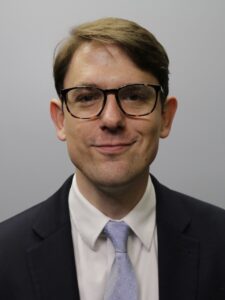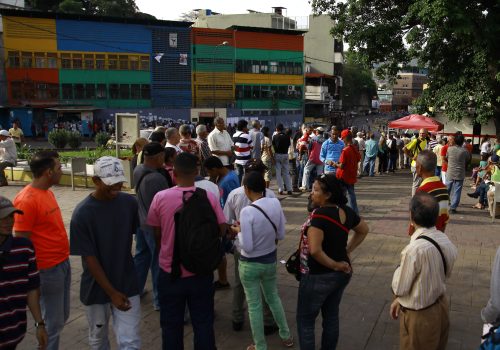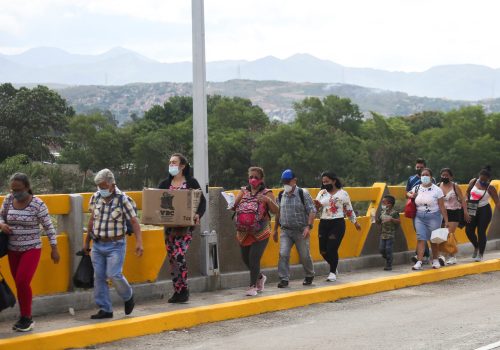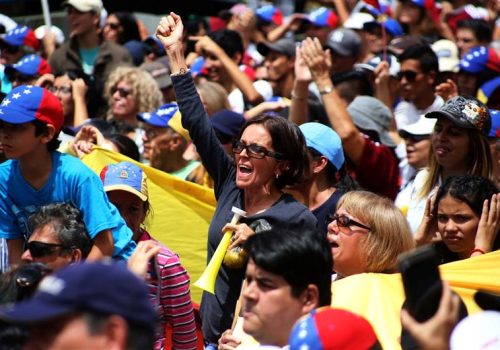Getting Venezuela’s historic humanitarian accord up and running
Table of contents
Introduction
Venezuela’s social agreement
Delayed implementation and mixed messaging
Policy recommendations
Conclusion
Acknowledgements
About the authors
Introduction
Venezuela’s political, economic, and humanitarian crisis has generated one of the largest and most complex emergencies around the globe today. By implementing a historic humanitarian agreement reached between the Venezuelan opposition and the Maduro government, the United States has a unique opportunity to address human suffering on the ground while also working to advance a political solution. While the situation in Venezuela may have fallen from international headlines in recent years, the United States and its allies across the Americas have a clear interest in working to resolve the humanitarian and political emergency in Venezuela, which has generated an exodus of 7 million refugees and migrants and allowed US geopolitical rivals to deepen their influence.
In recent years the international community has reached a consensus that the best way to resolve Venezuela’s crisis is by incentivizing negotiations between the government of Nicolás Maduro and the democratic opposition. Progress has not been easy. Since Maduro came to power in 2013, four internationally backed attempts to encourage negotiations have begun and ended with no significant breakthroughs.
The current process, however, has proven to be an exception. Unlike previous attempts at negotiations, this round of talks has resulted in substantial agreements between the Maduro government and the opposition. Negotiations began in August 2021, when two nine-member delegations representing the Maduro government and the US-backed opposition Unitary Platform coalition met in Mexico City to agree to discuss an ambitious agenda to resolve the crisis—including addressing humanitarian needs, free and fair elections, restoring constitutional order, and reparations for victims. Since then, the parties have remained in regular communication behind the scenes, and negotiations are ongoing in Caracas with Mexico City serving primarily as a platform where the delegations announce finalized agreements reached in the process.
The most recent formal agreement in the negotiations, announced on November 26, 2022, marked a historic breakthrough. After years of protracted crisis, the Venezuelan negotiators signed the “Second Partial Agreement for the Protection of the Venezuelan People.” The accord has major ramifications for millions of Venezuelans experiencing the consequences of the country’s humanitarian crisis, including the 7.7 million that the UN estimates are in need of humanitarian assistance.
The agreement also has significant implications for the future of negotiations. If this humanitarian deal is not implemented, it will likely spell the end of current efforts to advance dialogue towards a political solution and raises the prospect that the Maduro government could access funds through other means that may be diverted by corruption and mismanagement. The stakes are high, and the international community faces a historic opportunity that could be lost unless the accord is implemented successfully.
In this context, the United States has an urgent opportunity: It can and should work to reinvigorate the Mexico City process by facilitating the creation of a United Nations-managed trust fund, fulfilling a November 2022 agreement, and helping to build trust between government and opposition negotiators.
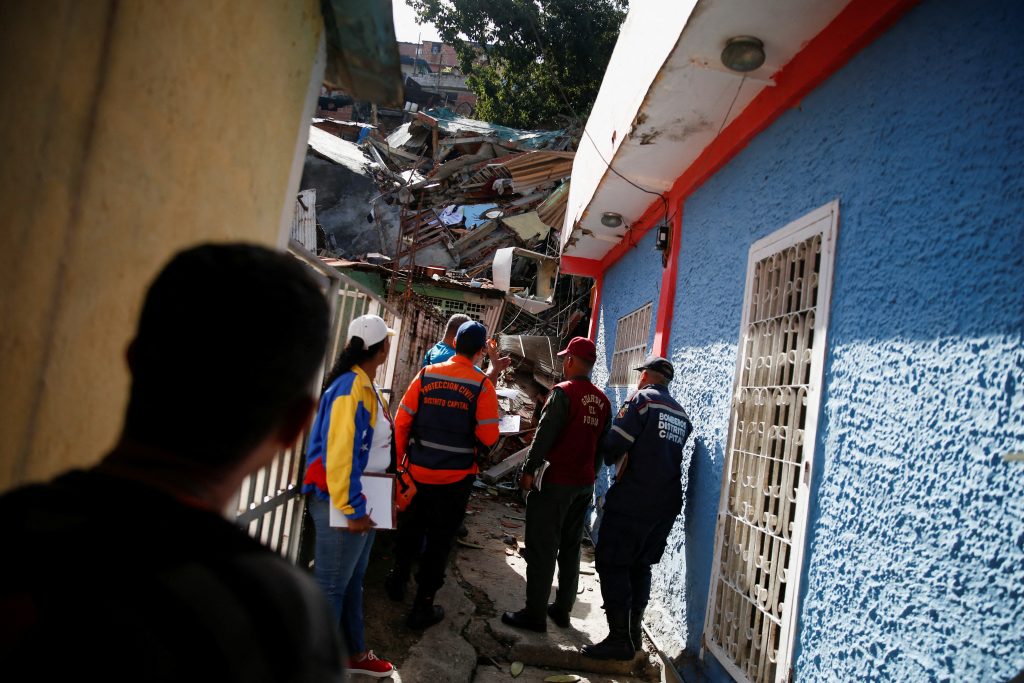
Venezuela’s social agreement
The accord, referred to by the negotiating parties as the Social Agreement, established the basis for creating a series of humanitarian and development assistance programs funded by Venezuelan assets that have been frozen abroad by the United States’ financial sanctions. While no set amount is mentioned in the public version of the agreement, opposition sources close to the negotiations claim that the full implementation of the projects that are outlined in unpublished annexes of the deal would require approximately $3.2 billion. This amount was aspirational from the beginning, under the recognition that not all of the funds would be available at once. In theory, this amount could be gradually unfrozen and channeled into a UN-managed trust fund, referred to as the “Social Protection Fund,” which would benefit the Venezuelan people. In practice, however, the process of identifying, unfreezing, and transferring funds will take time, so US officials have cautioned that initial contributions to the fund will be significantly smaller.
2023 UN humanitarian response plan funding request vs estimated funding needs for full social agreement implementation
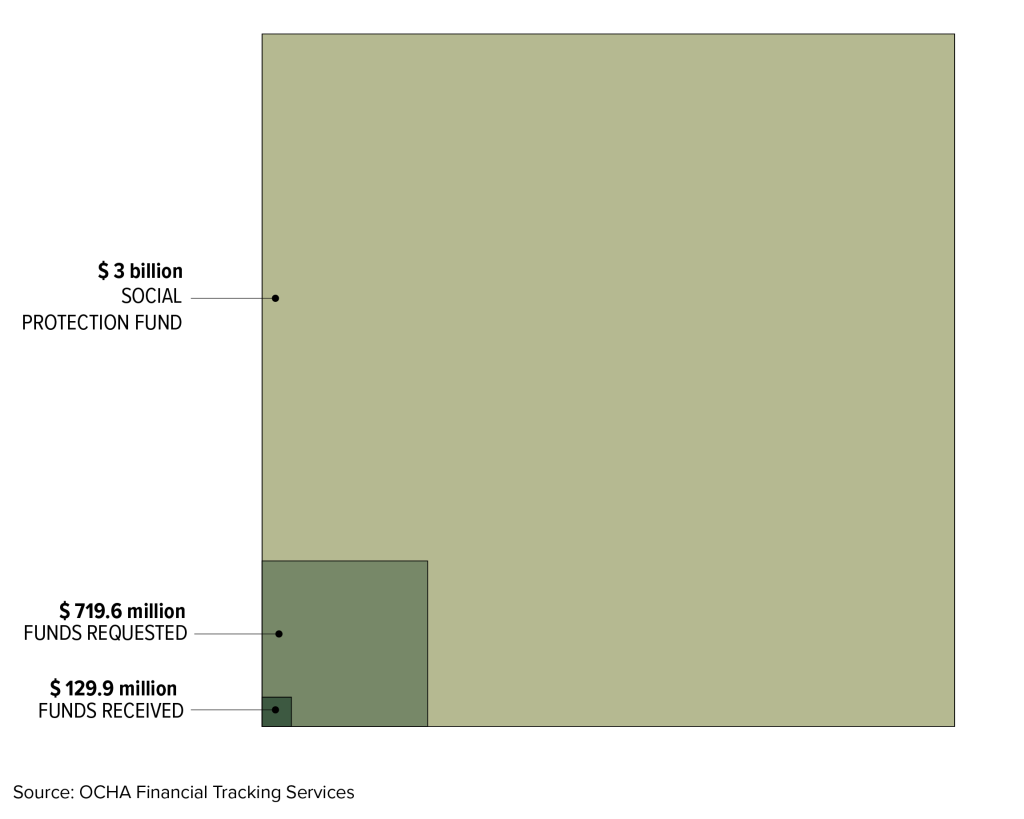
In the initial agreement, humanitarian and development programs would be implemented with the participation of United Nations agencies and monitored by two newly created bodies made up of three representatives each from both the government and the opposition. The first, named the Mesa de Atención Social, or the Social Attention Roundtable, was set up to oversee specific aid efforts, while the second, the Grupo Especial para la Atención de los Efectos del Sobrecumplimiento or the Special Group to Address the Effects of Overcompliance, was tasked with identifying and evaluating the effects of overcompliance with US sanctions in the international financial system. Since these initial talks, the conversation has evolved and the parties have now accepted an alternative structure of the fund that would be more in line with the UN’s traditional multi-donor trust fund model.
While US sanctions have included carveouts for humanitarian assistance, banks and other financial institutions have been traditionally risk-averse to doing business in Venezuela since the first sectoral economic sanctions were issued in August 2017. This has had a documented impact on humanitarian organizations in Venezuela, which have dealt with frozen transactions, bank closures, and other complications as an indirect result of sanctions.
The public-facing text of the Social Agreement outlined five key areas of focus for the assistance programs, each of which is connected to specific projects that have been designed and agreed upon by the parties and which are detailed in private annexes. These are:
- restoring the public health system
- rehabilitating the country’s broken electrical grid
- addressing malnutrition with an emphasis on children in need
- improving public education infrastructure
- providing relief for victims of recent floods in central Venezuela
These initiatives would be funded by Venezuelan assets frozen abroad and implemented with the significant involvement of agencies within the United Nations system, including the World Food Programme (WFP), the Pan-American Health Organization (PAHO), the United Nations Children’s Fund (UNICEF), and the United Nations Development Programme (UNDP).
It is difficult to overstate the importance of this agreement. It represents a significant step in the negotiations process—one that could help build momentum to progress the remaining items on the negotiating agenda, such as electoral and judicial agreements. But the agreement also matters in more direct and tangible ways to Venezuela’s struggling population. For 2023, the United Nations Venezuela Humanitarian Response Plan is asking for roughly $719 million to fund all of its humanitarian activities across the board. The UN Humanitarian Response Plan has never received more than 40 percent of its funding, so the potential for additional resources through the Social Protection Fund could be life-changing for those suffering from a lack of basic necessities in Venezuela.
Delayed implementation and mixed messaging
In the months since the signing of the Social Agreement in November, progress in the transfer of funds or the implementation of assistance programs has been slow. Much of the initial delay appears to be due to bureaucratic hurdles within a range of institutions.
On one hand, the United Nations is concerned about the reputational risk of implementing a program that has drawn comparisons to the controversial Oil for Food Programme in Iraq—a program that was rife with mismanagement and corruption. Moreover, UN officials want guarantees of where the funds are, how the US and international community can help shield them in the transfer process, and how they can exist within the United States financial system in line with internal United Nations financial regulations.
On the other hand, there have been delays on the US side as well. In December 2022 the United States State Department sent a demarche to the United Nations that signaled that the US government could not fully guarantee that the Social Protection Fund could exist in the United States in ways that shielded it from creditors with claims to Venezuelan debt. Since then, the United States has reversed course, and in May 2023 the Biden Administration sent a second letter to United Nations representatives, this time guaranteeing that the fund could exist in the US financial system and that indicated the risk from creditor claims was minimal in order to benefit the Venezuelan people. US officials have also begun working with European banks to identify frozen funds for the agreement.
Understanding that the implementation of the fund will take time should not come as a surprise. The parties involved in signing the accord agreed that progress on broader negotiations “can not be conditioned, suspended, or delayed by any aspect derived from the execution of the present agreement.” This suggests that the parties recognized that the implementation of the Social Agreement would not be immediate. However, the United States and the international community should proactively look for avenues to help advance its realization.
This issue brief highlights five key recommendations for policymakers and civil society leaders in the United States and abroad to help shape the way for the successful and efficient implementation of Venezuela’s Social Agreement—in both the short and long term.
Recommendations
- Assist in identifying and unfreezing Venezuelan assets held abroad. Until the Fund is created, authorize direct transfers to United Nations agencies.
- Establish and commit to a unified strategy and joint messaging to facilitate the implementation of Venezuela’s Humanitarian Accord.
- Encourage the United Nations to build on its success in managing multi-donor trust funds to ensure transparency and oversight of the Social Protection Fund.
- Ensure that creditors’ valid legal claims to repayment do not prevent assistance for the Venezuelan people.
- Ensure coordinated international support for the negotiations process, reinforcing the need for the Maduro government to reach significant political agreements with the opposition.
Recommendation 1: Assist in identifying and unfreezing Venezuelan assets held abroad. Authorize direct transfers to United Nations agencies
Starting with low-hanging fruit could be the best way to move forward in implementing the Social Agreement. There are large quantities of money in frozen assets held at financial institutions across the world that could be transferred to United Nations agencies efficiently and securely. While this short-term approach is a quick fix for delays currently weighing on United Nations and government agencies, it does send a message of support for the larger obstacles ahead.
However, transferring hundreds of millions of dollars worth of frozen funds is exponentially more complex than a regular wire transfer. First, each account needs to be located and the funds within them accurately estimated. While the Maduro government and opposition each have attempted to map out where and how much Venezuelan funds have been frozen by sanctions, estimates vary widely.
Once the figures are recognized, the United States Department of Treasury’s Office of Foreign Assets Control (OFAC) should help financial institutions reduce the risk associated with transferring frozen funds by issuing detailed licenses and comfort letters guaranteeing that such transactions will not violate US sanctions.
However, outreach from OFAC should go beyond this as a measure to avoid over-compliance. Financial institutions that hold portions of Venezuelan assets respond to shareholder interests like any other business. In most cases, these interests include banking with an institution that does not finance autocratic regimes. Unless properly communicated, engaging in money transfers to Venezuela could generate adverse effects on investor holdings and consumer demand for banking services due to a decrease in public trust.
To avoid this scenario, OFAC should engage directly with local authorities to ensure they echo the authorization of the transfers, providing tranquility to shareholders and thus avoiding over-compliance concerns.
A final, and arguably difficult step is getting the Maduro government to formally request the funds to be transferred to the United Nations. As the nominal account holder of many of these bank accounts, the Maduro government would have to request that the money be transferred to the UN-established trust fund, even after such transfers are greenlit by US and local governments.
Recommendation 2: Establish and commit to a unified strategy and joint messaging to facilitate the implementation of Venezuela’s Humanitarian Accord
The successful implementation of Venezuela’s Humanitarian Accord depends entirely on the efficient and streamlined coordination of a variety of global stakeholders including the Maduro government, Venezuelan political parties, the United States government, the United States Treasury, the United Nations, financial institutions, and countries holding frozen funds.
While coordinating all these actors could be considered one of the greatest challenges for the successful implementation of the Social Fund, the need for internal coordination within each body adds a layer of complexity. Most of these institutions still disagree on what the correct approach to the crisis should be. In the United States alone, opposing views among Congress, State Department, US Treasury, and the White House have slowed down the country’s ability to display joint advances toward implementation policies.
Establishing a unified strategy that all actors commit to requires precise efforts to ensure that the greatest number of relevant voices are heard and incorporated into the process, including government agencies, Congress, banks, and smaller actors like Venezuelans in the diaspora and the families of people illegally detained in Venezuela. The United States, from its unique position as a key player, should spearhead coordination efforts by creating systematized mechanisms for fund identification, financial institution assurance, and official fund requests from within Venezuela.
A unified strategy offers multiple benefits beyond efficiency measures. Firstly, it provides an opportunity for the Unitary Platform and the international community to develop a robust messaging campaign aimed at educating the Venezuelan public about the fund and the specific programs that would be supported by the incoming capital. This communication campaign would not only celebrate the creation of the fund but also emphasize the victory of the opposition negotiators in obtaining it.
Furthermore, increased awareness of and engagement with the Social Agreement would generate critical buy-in from local and international communities, particularly as the regime faces incentives to claim sole credit for the incoming funds. By implementing a joint strategy and messaging approach, the opposition can generate broader buy-in, effectively demonstrating their ownership over the negotiation process while convincing third-party actors of its legitimacy.
Finally, adopting this strategy helps move the negotiations forward, but also highlights the potential consequences of inaction for the Maduro government. It could encourage them to pursue political advances, release political prisoners, engage in political dialogue, make democratic progress in terms of elections, and demonstrate goodwill toward other relevant actors.
Demands put forth through these channels would signal the international community’s commitment to supporting a credible and meaningful negotiation process in Venezuela, which could expedite the implementation of the agreement before its deadline.
Recommendation 3: Encourage the United Nations to build on its success in managing multi-donor trust funds to ensure transparency and oversight of the Social Protection Fund
The United Nations is well-suited to oversee the Social Fund. Since the controversy over the Oil for Food Programme in Iraq, the UN has drastically increased its transparency standards, creating a set of financial rules and regulations to avoid a repetition of the corruption, fund mismanagement, and illegal surcharges identified throughout the Iraq program.
The Financial Regulation and Rules portion of the United Nation’s Finance and Budget chapter establishes a framework for decentralizing decision-making, aligning authorities with responsibilities, strengthening accountability, and delegating necessary managerial authority to heads of entities for effective mandate delivery. Similarly, the Planning, Programming, Budgeting, Monitoring and Evaluation (PPBME) provides financial and budgetary directives for all activities and programs undertaken by the United Nations. The instruments used to successfully manage funds ensure coordination, accountability, and adequate resource utilization.
With these new regulations, planning, programming, budgeting, and evaluation become an integral part of the United Nation’s general policymaking and management process. Regulation 4.2 of the PPBME in particular stipulates that a project’s objectives and strategies should be derived from policy orientations and goals set by intergovernmental organs that reflect Member States’ priorities. This regulation ensures alignment with legislative mandates and enhances the organization’s responsiveness to global challenges.
Moreover, the United Nation’s established procedures, governance mechanisms, grant-making processes, and experience in managing trust funds make it a reliable option to oversee the Venezuelan Social Protection Fund. Trust funds within the UN system are established through General Assembly resolutions or by the Secretary-General and adhere to financial regulations and rules. Governance of trust funds involves boards or steering committees comprising independent experts, UN agency representatives, donor countries, and civil society organizations. The secretariat for each fund, typically housed within a relevant UN agency, handles administrative services such as proposal evaluation, grant awards, disbursement, monitoring, and evaluation.
Over the years and with these new financial regulatory systems, the United Nations has gained extensive experience managing pooled financing mechanisms like multi-donor trust funds (MDTFs), which are a specific modality used to channel donor contributions to multiple implementing entities for country-specific programs. They offer flexibility in implementation procedures, minimizing delays and transaction costs.
MDTFs are managed by the Multi-Partner Trust Fund (MPTF) Office, which is administered by United Nations Development Programme (UNDP). The MPTF Office currently manages nearly 100 pooled financing mechanisms, representing over 95 percent of all funds channeled through UN-administered programs. While administering a multi-billion-dollar trust fund as envisioned in the Social Agreement would be a massive undertaking for the United Nations system, the UN should be encouraged to build upon its existing experience managing trust funds.
Recommendation 4: Ensure that creditors’ valid legal claims to repayment do not prevent assistance for the Venezuelan people
One of the most widely discussed challenges of implementing Venezuela’s Humanitarian Accord is the risk of funds being redirected to donors and creditors to service existing debt obligations.
If creditors file claims against the funds being transferred, ongoing transactions are frozen until the legal dispute is resolved, which often takes years to settle. A series of delays such as this would have dire consequences on the steps being taken to ameliorate Venezuela’s humanitarian crisis. While creditors should have their debts resolved promptly, the international community needs to establish pathways that safeguard money destined for the Social Protection fund against debt obligations, including through the creation of fiduciary funds. Fiduciary accounts protect funds from donors and creditors by ensuring that they can only be accessed by a principal, in this case, the United Nations. The reality is that as an international organization, the UN has comprehensive immunities that complicate lawsuits.
While groups of creditors such as the Venezuela Creditor Community have shown signs of good faith asserting they will not make claims to the Social Fund, it is important to be proactive to avoid delays in the case that claims are made. These creditors’ valid claims should be addressed, but ideally in a way that does not hinder funding for humanitarian purposes.
Recommendation 5: Ensure coordinated international support for the negotiations process, reinforcing the need for the Maduro government to reach significant political agreements with the opposition
The United States can do more to coordinate with allies in Latin America and Europe in order to maximize the potential for free and fair elections in 2024. Building off of the closing statement of the April 25 international conference on Venezuela held in Bogota, which highlighted a wide international consensus in favor of negotiations. The conference also ended with a commitment for an undisclosed number of participating countries to send representatives to Caracas to meet with the government, as well as with “opposition parties and sectors, and civil society, [and share] the results of the conference for their evaluation and comments.” This creates an opportunity for US diplomats to ensure consistency in the messages that are transmitted to Venezuelan political actors.
One way to do this is to conduct active diplomacy with key allies across Europe and the Americas in order to identify a shared sense of benchmarks needed ahead of 2024. The Biden administration should seek further high-level engagement to discuss Venezuela-related issues, including with governments that have different approaches. In recent years, governments ranging from the Petro and Lula administrations in Colombia and Brazil to president-elect Santiago Peña of Paraguay have begun to re-engage with the Maduro government directly after years of participating in a US-led isolation campaign. The European Union, while remaining supportive of a return to democracy in Venezuela, has begun to explore natural gas opportunities in Venezuela given the shifting energy markets after Russia’s invasion of Ukraine.
Communication with Caracas can be strategic but should reinforce efforts to press for negotiations that lead to free and fair presidential elections in 2024. Latin American and European governments should also be encouraged to support the opposition’s negotiating team in their deliberations with the Maduro regime. Publicly expressing support for the timely implementation of the Social Agreement is a vital way to boost the negotiating team’s credibility, and to ultimately ensure that Maduro faces the right incentive to continue to engage with the opposition negotiators.
Discrediting the team or supporting alternate negotiation pathways can undermine the opposition’s authority, weaken its position at the negotiating table, and provide the Maduro regime with bargaining power stemming from engagement alternatives.
Communication with Caracas can be strategic but should reinforce efforts to press for negotiations that lead to free and fair presidential elections in 2024.
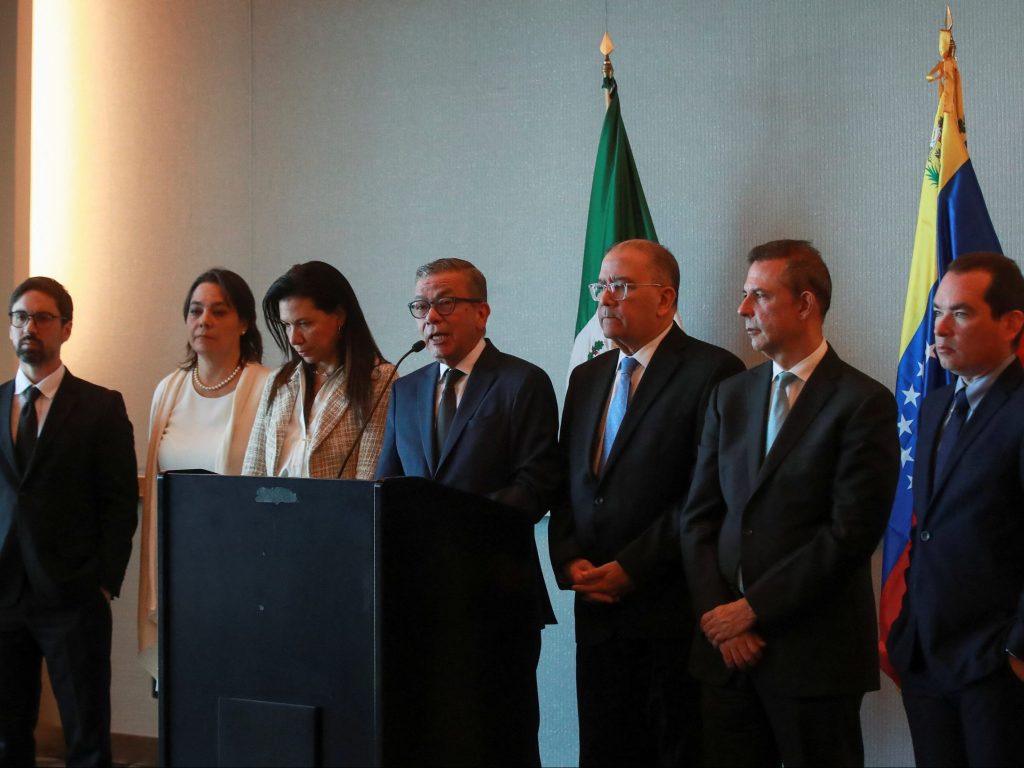
Conclusion
The agreement reached between the Maduro regime and the opposition in Venezuela represents a significant milestone in the ongoing negotiations to address the political, economic, and humanitarian crisis in the country. The initiatives described in the Social Agreement aim to address critical areas such as public health, electricity, malnutrition, education, and flood relief. If fully implemented, the agreement has the potential to bring about massive change and improve the lives of millions of Venezuelans who are in dire need of assistance.
However, the implementation of the agreement has faced bureaucratic hurdles and challenges on various fronts. While the United Nations has been cautious about ensuring transparency and avoiding mismanagement, the United States government has raised concerns about the protection of the funds from creditors with claims to Venezuelan debt.
This issue brief proposes a series of recommendations to expedite the implementation of the Social Agreement. These include assisting in identifying and unfreezing Venezuelan assets held abroad, establishing a unified strategy and joint messaging among relevant stakeholders, encouraging the United Nations to utilize its expertise in managing multi-donor trust funds for transparency and oversight, ensuring that creditors’ legal claims do not hinder assistance for the Venezuelan people, and providing strong and stable support for Venezuela’s opposition negotiating team.
By taking proactive steps to address these recommendations, the international community can help advance the realization of the agreement and provide much-needed support to alleviate the suffering of the Venezuelan population. The successful implementation of the Social Agreement could not only improve the humanitarian situation in Venezuela but also create momentum for progress in other crucial areas of the negotiations, such as electoral and judicial reforms.
Acknowledgments
This issue brief was informed by a series of consultations with representatives from the public and civil society sectors. We thank the many individuals and institutions who contributed to the research process, including the Venezuelan opposition, the United Nations, the US State Department, US Congressional Offices, and others. We are deeply grateful to our colleagues at the Adrienne Arsht Latina America Center (AALAC) team who helped produce this report, particularly Jason Marczak, senior director of AALAC for his guidance and editorial support. Our gratitude extends to the Atlantic Council Editorial team, including Cate Hansberry, Mary Kate Aylward, and Nancy Messieh, for their diligent editorial work and exceptional design skills. Most importantly, we thank all those who believe in the power of transnational cooperation for the benefit of millions.
About the authors
Geoff Ramsey is a Senior Fellow at the Adrienne Arsht Latin America Center and a leading expert on US policy towards Venezuela and Colombia. His work has been published and cited in Foreign Policy, the New York Times, the Wall Street Journal, the Washington Post, the Economist, and other major media outlets.
Ignacia Ulloa Peters is an Assistant Director at the Adrienne Arsht Latin America Center where she focuses on Venezuela, Mexico, and the southern Andes. Her work on Venezuela focuses on advancing transatlantic nonpartisan engagement on Venezuelan issues while promoting a deeper understanding of the complex crisis.
Related content

The Adrienne Arsht Latin America Center broadens understanding of regional transformations and delivers constructive, results-oriented solutions to inform how the public and private sectors can advance hemispheric prosperity.
Image: People hold a Venezuelan flag and placards as union workers, members of political opposition parties, and others participate in a protest against the government of Venezuela's President Nicolas Maduro. REUTERS/Gaby Oraa
